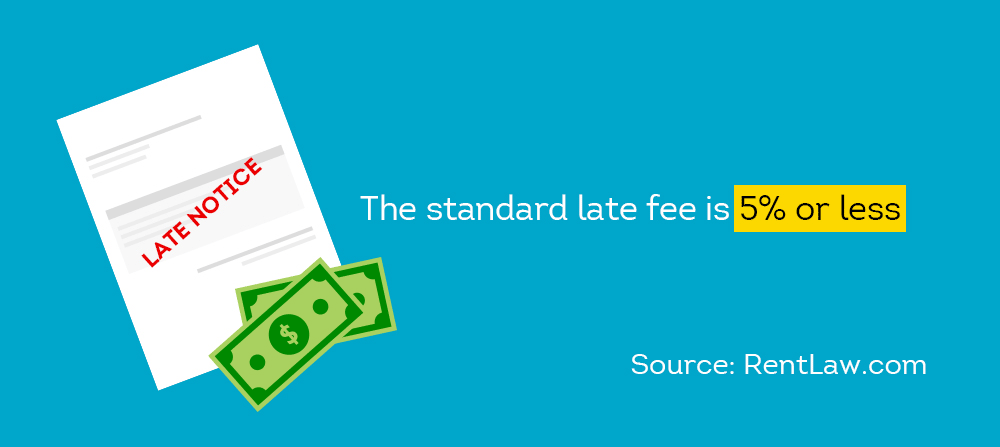Disclosure: This content, except as otherwise indicated or stated on this site, is the property of TransUnion Rental Screening Solutions, Inc. This content is for educational purposes and for convenience only. Trademarks used are the property of their respective owners, and no endorsement or affiliation is implied. The information presented in this content is “as is” without warranties of any kind, and specifically is not represented to be complete and does not constitute legal advice, and is subject to change without notice. You are encouraged to check these terms from time to time for changes, and by accessing this site you agree to these terms and all terms listed. Laws and regulations may vary by state and locality. Consult your own counsel if you have legal questions related to your rental property practices and processes.
Dealing with a tenant who never pays rent on time? Maybe you have a renter who’s been taking advantage of the grace period, seeing how far they can push your patience.
Giving your tenants an extra bit of time to pay rent has certain benefits, but failing to impose a late charge for rent altogether can lead to some major consequences. A TransUnion survey found that payment problems ranked as the top concern by 84 percent of landlords. If you’re not sure how to walk the fine line, keep reading for some useful advice on how to properly address late rent, grace periods, and how to best protect the future of your rental business.

Should Landlords Provide a Grace Period?
In order to answer that question, you first need to fully understand what it is and how it works. A grace period is a provision in a lease agreement which allows the rent payment to be received for a certain period of time after the actual due date—without penalty or a standard late fee. It’s important your tenant knows they are not automatically entitled to a grace period unless it’s stated in your lease or required by state law.

Say you have a tenant whose lease agreement states that rent is due on the first of the month and after failing to pay rent on time incurs a $25 penalty. If you were to add a 3 day grace period to your lease, the tenant would have until the fourth of the month to submit payment without being charged a penalty. If you were to provide a 5 day grace period, you could charge a late fee for rent on the sixth of the month.
Grace periods are very common in real estate, but you’ll also find these buffers in a number of billing cycles such as insurance contracts or credit card statements.
Why? It may seem counterintuitive, but there’s actually a handful of benefits a 3 or 5 day grace period offers.
- Your rent money could be in transit. If you don’t collect rent online, your tenants’ money might not be received by the first of the month. Some landlords ask their renters to go to the bank and directly deposit rent money into their bank accounts, but transfers may take time.
- Before imposing a standard late fee for rent, check in with your tenant and ask if they’ve submitted a payment. Taking a second to clarify things could potentially save you from some unnecessary tension or misunderstandings later on.
- Pro tip: Consider making the switch and collect rent online. According to a survey conducted by SmartMove, 6 out of 10 landlords prefer to collect rent online. It’s easier for both you and your tenants, plus everything is digitized and documented. If they consistently fail to pay rent on time, you’ll have it documented.

- Some people live paycheck to paycheck, and payday can fall around the first of the month. A 3 day grace period gives them time to make sure the necessary funds are in their account and that their payment can be adequately processed.
- A bounced check can be embarrassing—for both your tenant, and you, if you try to make a payment with money that’s missing from your account, and might cost you another fee for the invalid transaction. In addition to the standard late fee for rent, be sure to include a penalty for bounced checks in your lease agreement to try to prevent this from happening, when permitted by local law. The penalty may be the amount of the bounce fee.
- There are a number of unexpected obstacles that could affect rent payment on the first. The due date could fall on a holiday, the bank might be closed, your tenant could be traveling… the list goes on.
Allowing for a grace period before imposing a late charge for rent shows your tenant patience and understanding.
Should Landlords Charge a Late Fee?
Some landlords would suggest yes; it’s one of the best ways to encourage consistent, on-time rent payment. According to a survey by CitiGroup, more than half of Americans have paid a late bill, simply because they forgot.
You should be highly incentivized to collect rent in full when it’s due for a number of reasons.
- You have your own bills to pay. If tenants fear late fee charges for rent, they’ll be more motivated to get their payment in on time. You’re likely using your rental business to pay off your property mortgage and you need this money to meet your own obligations on time.
- Once your tenant falls behind, it’ll be hard for them to catch up. If you don’t catch the problem early, you could find yourself progressively slipping into partial payments—which is not a place you want to be.
- Without a late fee for rent, your tenant might get lax and turn late payments into a habit. You might let it slide the first time, but without a precedent set, you could be taken advantage of pretty quickly.
Setting Late Rent Fee Amounts
You’ll need to determine how much to charge for late rent payments, so be sure to come up with a number that’s reasonable and fair. A standard late fee for rent is 5 percent of rent or less.

Always check your local and state laws that dictate how much of a fee landlords are allowed to charge for late rent; depending on where you rent, there may be a maximum amount that you can collect in late charges for rent.
What are the Limits on Late Rent Fees?
As noted, what you can charge and when you can charge it depends on your state laws. Remember that before you aggressively go after a tenant who seems to never pay rent on t
ime, late rent fees must be included in your written lease agreement. Without the written provision in a lease or rental agreement, a late fee for rent is unenforceable.
Collecting Late Rent
Instead of trying to track down tenants and collect late rent, be proactive and save yourself the headache. You can send advanced reminders to alert your tenants that it’s about that time, and if someone is nearing the end of their 3 or 5 day grace period, communicate with them to remind them about the late fee for rent.
If the due date and grace period comes and goes, it’s time to serve a Late Rent Notice. Hopefully the tenant resolves the situation—if not, it might be time to read up on the eviction process for unpaid rent.
Be sure to keep record of any late payments that are made and provide a copy to your tenant. This not only keeps you and your tenant accountable, but can be used as a reference if the need for eviction comes about.
How to Encourage Your Tenants to Pay Rent On Time
Strategies like email reminders and texts, convenient online rent collection, and consistent late fee enforcement are all excellent ways to promote timely payment. If you have the ability and can prompt your tenant to enroll in monthly, automatic payments, you both should find yourself in a safe spot.
Your best bet for avoiding late rent payments is to fill your property with the best possible tenants from the start. Conducting a tenant credit check with TransUnion SmartMove will give you the insights you need for a better peace of mind about your renters’ financial responsibility. With SmartMove, you will receive compliant and comprehensive reports:
SmartMove is the landlord’s solution for great reports, great convenience, and great tenants. Avoiding renter payment problems is now easier than ever with Income Insights. Landlords receive the information they need to better evaluate whether their applicant can afford the rent in addition to credit reports for renters, tenant history check, and eviction check – all in a matter of minutes.
SmartMove developed its own proprietary renter scoring model called ResidentScore, which you will also receive. After analyzing millions of rental outcomes, SmartMove’s ResidentScore weighs over 200 variables to assess renter risk. When compared to a generic score, ResidentScore is able to predict eviction risk 15% better which could help landlords to potentially avoid a very undesirable outcomes, like eviction or non-payment of rent.
With a better understanding of your tenant’s background, you can make a quicker leasing decision and keep the rent check coming on time.
Know your applicant.
Additional Disclosure:
The information posted to this blog was accurate at the time it was initially published. We do not continue to guarantee the accuracy or completeness of the information provided. The information contained in the TransUnion Rental Screening Services, Inc. blog is provided for educational purposes only and does not constitute legal or financial advice. You should consult your own attorney or financial adviser regarding your particular situation. For complete details of any product mentioned, visit www.transunion.com. This site is governed by the TransUnion Rental Screening Privacy Policy Privacy Notice located at TransUnion Rental Screening Solutions, Inc. Privacy Notice | TransUnion.



